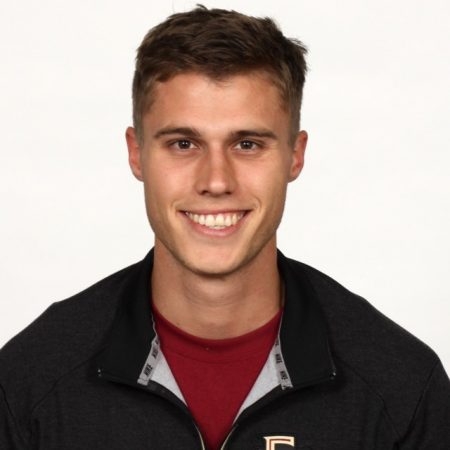
How does one juggle a demanding schedule of a top NCAA athlete while studying for a doctorate in the challenging subject of chemistry?
Florida State University’s Stefan Brits is one of the few people in the world who can answer that question with first-hand experience.
“It’s not easy, but it’s definitely not impossible.”
It is a somewhat modest answer from Brits, a long jumper on FSU’s track and field team who will compete at the NCAA Indoor Track and Field Championships beginning Friday, March 11, in Birmingham, Ala.
The four-time All-American will be competing at his second indoor national championships — and fifth overall — as the No. 12 seed nationally after scoring a lifetime-best leap of 7.82 meters at the ACC Championships two weeks ago.
Injuries have hampered his otherwise successful athletics career — enough for the NCAA to award Brits a fifth year of eligibility in both indoor and outdoor track and field this season.
And Brits plans to make the best of the opportunity.
“It has been a rough ride,” Brits said. “To be able to come back and use my last year and already be jumping my best at FSU is tremendous for me. I’m definitely excited to go out there and compete and be able to keep improving.”
Brits, a native of Cape Town, South Africa, attended college in his home country for about six months, but he liked the balance of academics and athletics offered at U.S. universities.
The realization helped him land at Florida State in 2012, and being a part of the Seminole family has been a perfect fit for the star student-athlete.
“It’s the only place where I could study my academics at a really high level and also compete at a really high level,” Brits said. “That’s the main reason I came to the U.S. — not just to compete in track and field. There’s no way I would have been as successful in my academics if I stayed back home. There’s no doubt about that.”
Brits, who grew up wanting to be a doctor, began at FSU in the pre-med program. But it wasn’t long before he found his true passion — chemistry. He had been taking pre-med prerequisites and after a semester of frequently dreaded organic chemistry, Brits decided to switch his major to chemistry with medical school still the ultimate goal.
He started doing undergraduate research to build his résumé for medical school. Instead, he found the inspiration to pursue a career in chemical research.
“In chemistry, you don’t just memorize, you have to put things together and solve the ultimate problem, which I fell in love with,” Brits said. “I can use my brain not just to recall what I learned but also to solve a problem right at that moment.”


In August 2014, Brits approached Assistant Professor Justin Kennemur — a new faculty member at the time — hoping to gain research experience.
“I knew right away from his enthusiasm and ability to communicate science that he was the first undergraduate researcher to join my program,” Kennemur said.
Kennemur and Mark Kearley are among several faculty members who encouraged the three-time Academic All-American to apply to Florida State’s very selective doctoral program in chemistry.
“Stefan’s time is extremely valuable due to his participation on the varsity track team, but he seems to handle the rigors of balancing his commitments quite effortlessly,” Kearley wrote in Brits’ recommendation for graduate school. “He is an extremely bright young man with a wonderful personality, and I see no limit to his future as a research scientist.”
Brits is one of about 30 students who were selected into the competitive program this year and one of the few without several years of industry experience.
“It’s definitely difficult just to get in,” Brits said. “I feeling like getting into the program might be more difficult than once you are in.”
Now, Brits is a 24-year-old graduate student within Kennemur’s research group. Balancing classes, training and competition is second nature for Brits, but the research that comes with being a doctoral student has raised the intensity of his schedule another notch. Plus, he is teaching an online class to undergraduates three hours a day.
“Getting research done is the most difficult part because you have to be in the lab at all different times to run experiments — and they take time,” Brits said. “Classes aren’t that hard, but the research that comes with it is like a full-time job.”
Kennemur is confident that Brits will continue his high level of achievement even with the added challenges.
“The future for Stefan is very bright no matter what he sets his mind to, and I am very proud to be helping this young man achieve his goals in science,” Kennemur said.
This week, however, Brits will be focusing on the goals he has set for the upcoming NCAA Indoor Championships.
It will be the first time he will compete at NCAA indoor meet since 2013 when he finished 6th — his highest-ever at a national championship.
“I have dates written down that I have to be able to compete at my best,” Brits said. “Every day, I keep looking at those dates. I think my biorhythms, and my mind, are already set to know when it is March 11. I have to be perfect. This is it.”
Brits is scheduled to compete in the long jump at 5:20 p.m. CT Friday. For a full list of events and results, visit http://www.ncaa.com/di-mens-and-womens-track-field-championship-results.
Watch: “Brits leaps to head of class” on http://seminoles.com.
Read: Brits Lands Long Jump Bronze At NCAA Indoor Championships on http://seminoles.com.




